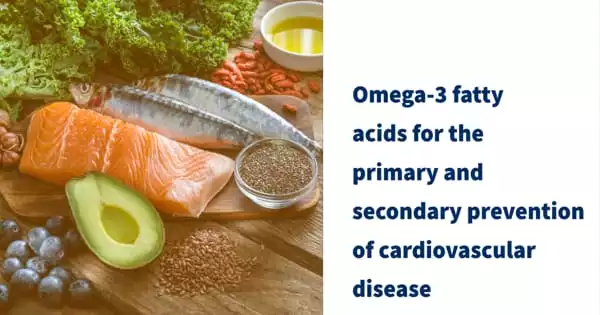Polyunsaturated fats, such as omega-3 fatty acids, are a form of fat. These lipids are required for the formation of brain cells as well as other critical functions. Omega-3 fatty acids help to maintain your heart healthy and protect you from stroke. They can also assist enhance your heart health if you already have it. Omega-3 fatty acids are not produced by the body on its own. You must obtain them through your diet. Certain types of fish are the finest providers of omega-3 fatty acids. They can also be obtained from plant foods.
The researchers did a comprehensive review and meta-analysis of 38 omega-3 fatty acid randomized controlled trials. They discovered that omega-3 fatty acids improved cardiovascular outcomes overall. The results of studies using EPA alone rather than EPA+DHA supplements revealed a considerably higher reduction in cardiovascular risk.
For decades, there has been a lot of speculation about whether omega-3 fatty acids can reduce the number of cardiovascular events. The results of the Reduction of Cardiovascular Events with Icosapent Ethyl-Intervention Trial, published in the New England Journal of Medicine in 2018, demonstrated that a high dose of a purified ethyl ester of eicosapentaenoic acid (EPA) in patients at high cardiac risk significantly reduced cardiovascular events.
This meta-analysis provides reassurance about the role of omega-3 fatty acids, particularly prescription EPA. It should inspire researchers to look into the cardiovascular effects of EPA in a variety of clinical scenarios.
Deepak L. Bhatt
The trial’s findings led to the FDA, Health Canada, and European Medicines Agency approving the prescription medication icosapent ethyl for lowering cardiovascular risk in people with high triglycerides, as well as modifications to global guidelines. However, previous and later investigations of omega-3 fatty acid supplementation containing EPA and docosahexaenoic acid have yielded conflicting results.
A systematic review and meta-analysis of 38 randomized controlled trials of omega-3 fatty acids was undertaken by researchers from Brigham and Women’s Hospital and other institutions. They discovered that omega-3 fatty acids improved cardiovascular outcomes overall. The findings, which have now been published in eClinical Medicine, demonstrate that studies of EPA alone, rather than EPA+DHA supplements, resulted in a considerably higher reduction in cardiovascular risk.
“REDUCE-IT has heralded a new era in cardiovascular prevention,” stated senior author Deepak L. Bhatt, MD, MPH, executive director of Interventional Cardiovascular Programs at the Brigham and main investigator of the REDUCE-IT trial. “REDUCE-IT was the EPA’s largest and most rigorous contemporary experiment, although there have been others as well. Now we can see that the sum of evidence supports EPA’s robust and consistent benefit.”

Bhatt and colleagues conducted a meta-analysis of 38 randomized clinical studies involving omega-3 fatty acids, including EPA monotherapy and EPA+DHA treatment. More than 149,000 people took part in these trials in all. They looked at major cardiovascular outcomes such as cardiovascular mortality, nonfatal cardiovascular events, hemorrhage, and atrial fibrillation. Overall, omega-3 fatty acids have been shown to reduce cardiovascular mortality and enhance cardiovascular outcomes. When compared to EPA+DHA trials, EPA trials demonstrated greater relative reductions in cardiovascular outcomes.
The researchers point out that while both EPA and DHA are classified omega-3 fatty acids, they have different chemical properties that influence their stability and the severity of the effect they can have on cholesterol molecules and cell membranes. To present, no trials have investigated the effects of DHA alone on cardiovascular outcomes.
“This meta-analysis provides reassurance about the role of omega-3 fatty acids, particularly prescription EPA,” Bhatt added. “It should inspire researchers to look into the cardiovascular effects of EPA in a variety of clinical scenarios.”
Most health experts believe that eating omega-3 fatty acids is the best approach to enjoy their advantages. Aside from omega-3s, whole foods provide a variety of nutrients. All of these things work together to keep your heart healthy. If you currently have heart disease or high triglycerides, increasing your intake of omega-3 fatty acids may be beneficial. It may be difficult to obtain enough omega-3 fatty acids through diet alone. Consult your doctor to see if taking fish oil supplements is a smart choice.
The risk of ingesting too much mercury or other toxins from fish is often offset by the health advantages of omega-3 fatty acids for most adults. Toxins found in fish include mercury, dioxins, and polychlorinated biphenyls (PCBs). Toxin levels vary depending on the type of fish and where it is caught.
Mercury naturally occurs in trace amounts in the environment. However, industrial pollution can cause mercury to collect in lakes, rivers, and oceans, where it can end up in the food fish eat. When fish consume this diet, mercury accumulates in their bodies.





